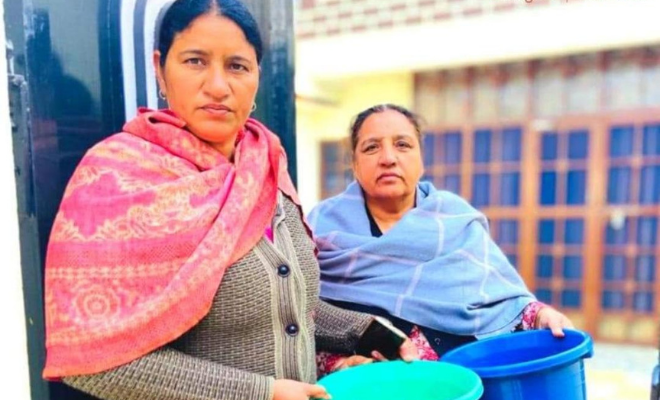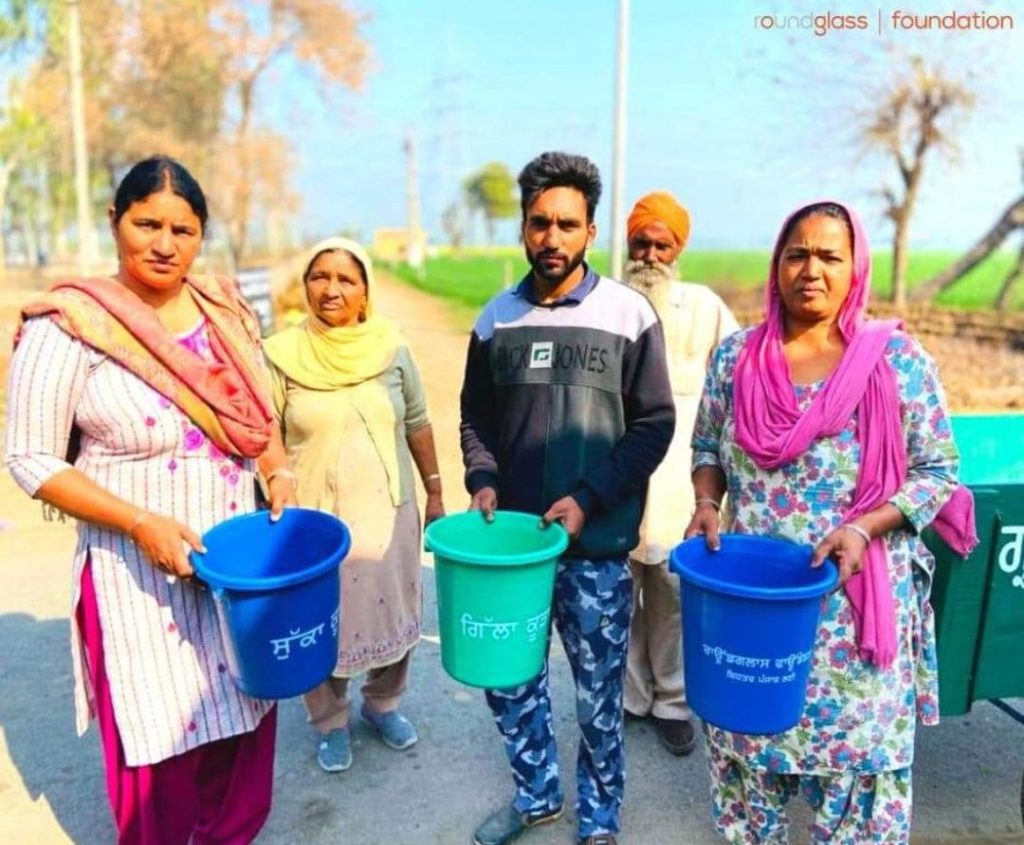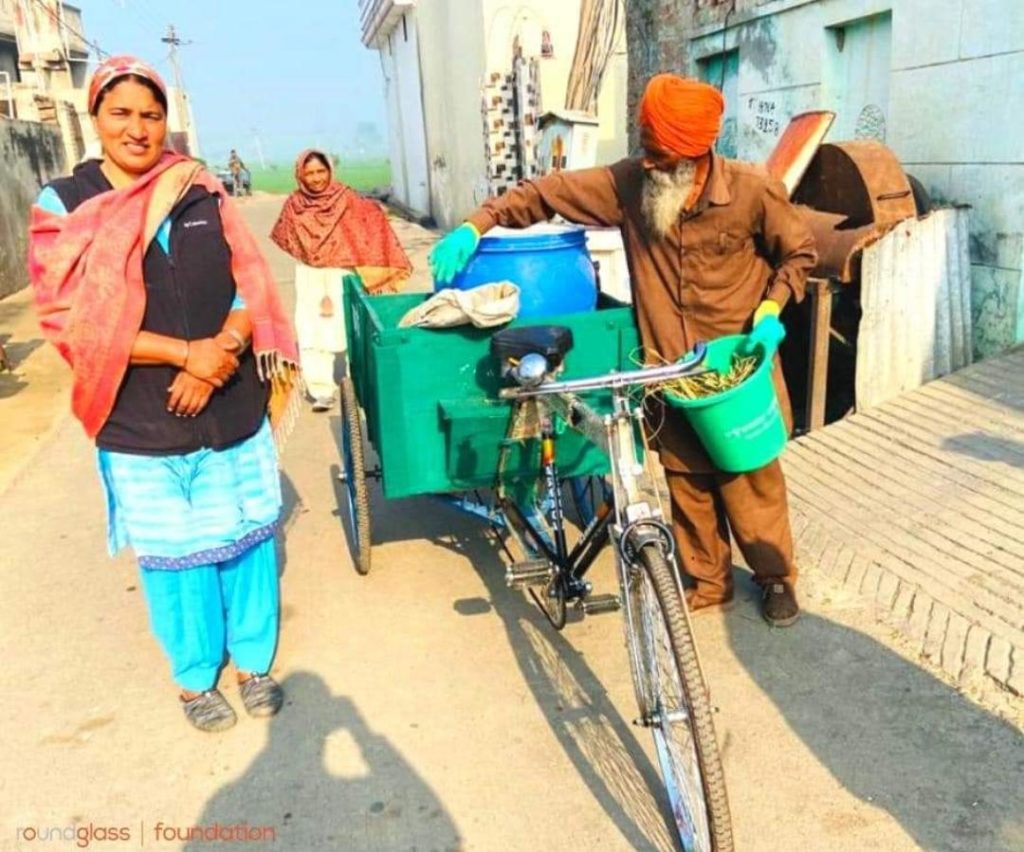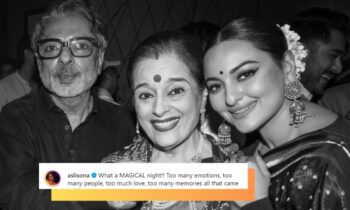This Woman From Punjab Single-Handedly Cleaned Up Her Entire Village. What An Inspiration!

Everywhere I look I see a lot of garbage. We as humans tend to litter a lot and it’s not really good for our environment. All these clean places that we see across India, do not clean themselves up on their own. But have you ever really thought about who cleans these places up apart from the people hired by the government? One person is not enough to clean up the garbage that hundreds and thousands of people litter. Now, as a person, we all have our own causes. I recently came across someone with a cause that made me realise how difficult cleaning up can be. 42-year-old Amarjeet Kaur from Punjab’s Fatehgarh Sahib district’s Tanda Bandha Kalan village not only worked for RoundGlass Foundation’s COVID-19 relief campaign but also worked for the waste management and plant for Punjab initiative of the organisation.
In conversation with Amarjeet, I uncover a truly inspirational story of overcoming limitations and making a difference.
Q: What’s your educational background?
A: I have studied till class 12, in Arts.
Q: Have you ever thought of becoming the sarpanch yourself? If not, why?
A: Yes, I have thought of being a sarpanch. In fact, I fought the last sarpanch election in my village but I lost. At present, my husband Sardar Nirmal Singh Gill is the village sarpanch. I may again fight in the next election due in 2024.
Q: Tell us about your journey and how you went from providing rations to the needy during COVID-19 times to cleaning up the village?
A: I worked with the RoundGlass Foundation and its COVID-19 Relief Campaign, providing ration to 51 needy individuals in our village. There were a lot of people who didn’t have proper IDs like the Aadhaar Card. I worked closely with them to help them get these IDs so they could get ration under the campaign. In addition, my family provided ration to 182 villagers who didn’t have enough to eat. I also organised the spraying of disinfectants in the village and helped villagers understand how to manage household waste.
Also Read: Woman Crashes Sister’s Job Interview And Thrashes Her For Affair With Her Husband
Q: What inspired you to take up this cause to clean up your village?
A: My in-laws’ family has been in public service for a long time. My husband’s grandfather and father served as village sarpanches for many years. My own grandfather and father were the zaildar and the lambardar of their village respectively. Therefore, my family is my inspiration. I have realised that a clean village is a healthy village. There was a 30-year-old filthy pond in the village that would cause many diseases among the villagers — especially hepatitis C. Now, we have filled it up and it’s in the process of being converted into a park. Since September 2020, our village has become much cleaner. You don’t see plastic bags or garbage, strewn anywhere. Many nearby villages got inspired by the transformation and launched this initiative in their villages.
Q: How did your family contribute to your cause?
A: My husband is my rock. He is the village sarpanch but because he keeps frequently travelling between India and Canada, I manage his responsibilities when he is not around. I have his 100 per cent support in all I do. We have two sons — they too are settled in Canada and fully support my social endeavours.
Q: Did you face any resistance from people when you started managing your husband’s sarpanch duties? How did you work through those problems?
A: Everyone has their opinion, but I don’t let that deter me from my task. Haathi apni mast chaal chalta hai (an elephant walks the way it wants to). I truly believe that if you do good, the world remembers you for it. Our Panchayat is united, and we resolve all our issues amicably.
Q: How did you manage to convince people to segregate waste? How is it working so far?
A: I went from door to door along with the waste collector and a few members of the panchayat and explained to the women of each household the importance of segregating waste and how it can be converted to compost. They understood what we said and joined the movement. I also organized the removal of garbage and junk — some as old as 30 years — lying at different spots in the village. Being a volunteer and an on-ground supporter helps me in my work.
Q: What was that one moment when you realised that you’ve reached a milestone?
A: The first milestone that made me proud was when I succeeded in filling up the old village pond, which was causing water-borne diseases among the villagers. And if I may add one more, I am also very proud of the fact that I have managed to keep our village Panchayat together, united. All the members have faith in my husband and me and we just focus on doing good work for the village.
Q: What is the easiest and the hardest thing about waste management?
A: The hardest task was to convince the waste collectors to segregate waste. They find the concept hard to understand and I had to sit with them and patiently explain the importance of this activity. Another challenge we face is that people don’t want to take up the job of a waste collector; there’s a stigma attached to it. The best way to remove this stigma is to educate people about the importance of living in a clean environment and explain how we should take pride in the work we do, and how all forms of work that benefit the community at large are good and respectable. The rest is easy.
Also Read: RJ Malishka’s Interview With Olympian Neeraj Chopra Is A Crash (And Burn) Course On How Not To Interview
Q: How has the pandemic affected your cause? What are the challenges you’re facing now?
A: COVID-19 restrictions were challenging; we had to ensure that people don’t step out of their homes. We also had to keep an eye on those who were in quarantine, take food and essentials to them. Not everyone listened to us. At times, we had to call the authorities if someone stepped out during quarantine.
Q: What do you think needs to change in India’s waste management strategy?
A: I think we are moving in the right direction. The strategy and the larger goal of a clean India are in place, but we need to perhaps improve the pace of work in order to reach the remotest parts of the country.
Q: What are your future plans for your village?
A: I want to convert my village into a place as clean and developed as Canada since most of my family lives there and I have heard so much about it. I desire to put my village on the world map. Whatever cleaning and waste management work is left in the village, I would like to complete it. In addition, it’s my dream to build an old age home in my village. Because I have seen how elderly parents nowadays are left alone by their children, I would like to take care of such people. I also want to build a community centre in the village that the underprivileged can use to organize the weddings of their children. Not everyone can afford fancy banquet halls.
Q: Does your gender impact the work you do? If yes, how?
A: No, it doesn’t impact my work. I do all the work of a sarpanch, I go to all government offices and to the police station. As long as your spouse supports you and you have confidence, gender doesn’t matter. And people will always talk, don’t listen to them.
Q: A message to inspire people to work for this cause.
A: If we have more women associated with this work, our nation will progress. Many women are made Sarpanches but they are not allowed to go to the Panchayat office or to meet the BDO (block development officer). Putting women in roles of power shouldn’t just be on paper. They need to be empowered in the real world to make decisions for themselves and the community.
Cleaning up the environment might not be a cause for you but you can always make an impact by making small changes in the way you dispose off garbage.



















